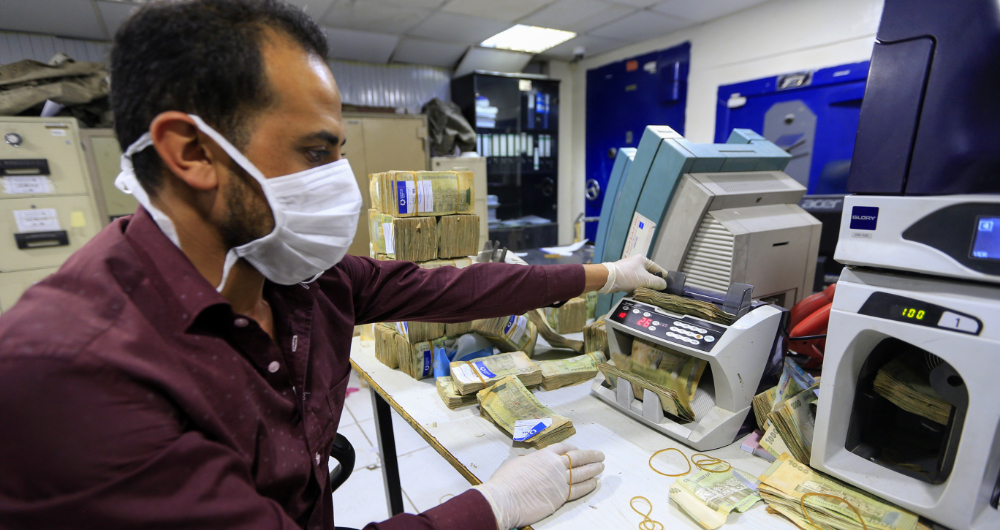AL-MUKALLA : The Central Bank of Yemen has strongly denied accusations it misused Saudi deposits and was involved in money-laundering and foreign currency rate manipulation.
In a statement seen by Arab News on Wednesday, the bank said that the latest accusations by the UN monitors were based on false information. It added that the bank’s financial activities have always been transparent and met international monetary and trade rules.
The bank claimed that the UN report could be based on misleading allegations from Yemen’s enemies, who target the central bank and its activities in Aden.
It added that the bank applied cautious, transparent policy in regard to the changing rate as the Yemeni riyal sharply fluctuated, which caused a sharp increase in prices of basic goods covered by the deposit.
In their annual report on the implementation of sanctions on the war-torn country, the UN discovered that the central bank helped a group of Yemeni traders make $423 million in profits from “a sophisticated money-laundering scheme of the Saudi deposit” and manipulating foreign exchange rules.
“The $423 million is public money, which has been illegally transferred to private corporations. Documents provided by the Central Bank of Yemen fail to explain why they adopted such a destructive strategy,” the UN report said.
Elsewhere, the Cooperative and Agricultural Credit Bank (CAC bank), a state-owned Yemeni bank, has moved its operations and main offices from Houthi-controlled Sanaa to the southern port city of Aden, the interim capital of Yemen, the news agency SABA said on Tuesday.
Yemen’s Minister of Finance Salem ben Brek told SABA that CAC bank is now responsible for paying public sector salaries in government-controlled areas.
The relocation of the bank is part of a government plan to bring the banking system in Yemen under its control and deprive the Houthis of millions of dollars acquired from taxes from Sanaa-based banks and mobile operators.
In September, Sabafon, Yemen’s oldest and largest mobile operator, announced that it would relocate its main offices and operations from Sanaa to Aden.
Yemeni President Abed Rabbo Mansour Hadi in September 2016 ordered the central bank headquarters to move to Aden to stop the Houthis from plundering its reserves.
The president’s move sparked an economic war between the two banks as the Houthis refused to pay salaries of public servants in areas under their control and banned banknotes printed by the Yemeni government in Aden.
Despite the Yemeni government efforts to control the exchange system, the Yemeni riyal on Thursday moved towards a new record low in the government-controlled areas after recovering late last year following the formation of the new unity government and the implementation of the Riyadh Agreement.
Moneychangers said that the riyal hovered around 870 against the dollar on Thursday, dropping from 700 riyals early this month.
The central bank closed unauthorized exchange companies, banned informal transfer systems between local exchange companies and provided food and fuel importers with hard currencies in a bid to curb the fall.
The measures briefly helped the riyal to recover before it started falling again.
Meanwhile, frustrated prisoner swap talks between representatives of the Yemeni government and the Houthis are continuing in Amman.
Brokered by the UN, warring factions in Yemen on Sunday resumed talks on swapping hundreds of prisoners under the Stockholm Agreement. Yemeni government officials previously told Arab News that both sides discussed releasing 301 prisoners, including some high-profile prisoners such as the Yemeni president’s brother Nasser Mansour Hadi.
On Tuesday, the Houthi released a government prisoner whose name was included among hundreds of prisoners who were released during the latest prisoner swap in October.
Government sources told Arab News that the Houthis agreed to release Basher Al-Hafashi, who was abducted by the Houthis four years ago and was later sentenced to death, after the head of the Yemeni government delegation in prisoner swap talks, Hadi Al-Haej, threatened to boycott the talks in Amman.
The Iran-backed Houthis bowed to the pressure and released Al-Hafashi, who arrived in the central city of Marib.
Majed Fadhail, deputy minister of human rights and a member of the government delegation in the talks, told Arab News on Thursday that the Houthis seek to swap their fighters with civilians who were abducted from their homes in Sanaa and the other Houthi-controlled areas.

KSrelief teams perform 4 open-heart surgeries on children in YemenAre Yemen’s Iran-backed Houthis firing warning shots across Biden administration’s bows?

